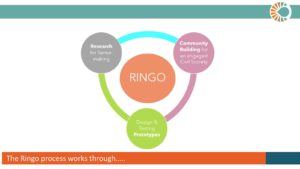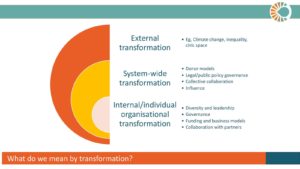
Our process is designed to address 3 things:
- what we want out of global civil society more broadly
- what that would look like from an institutional perspective
- Identify what may need to change in the wider system and how we can work towards that
Systems change processes have been pioneered over the last decade and used to help to break down barriers between the entrenched positions held by groups who have dominant power in a wider system. The RINGO project is convening 50 participants as part of a core process who represent ‘the system’, who will spend up to two years to help design and implement new models and prototypes.
With expert systems-change facilitation, led by Reos partners, the participants – selected for their experience and influence – will meet virtually [as a result of COVID19 limitations on travel] to explore their own and other’s roles in the system around INGOs, and will start to identify what needs to change, and more importantly, how. Participants will:
- Start to explore people’s desire to bring about change – why we need it, what’s not working, from the various perspectives present in the room. It would also explore people’s motivation and intent.
- Create a roadmap for where we want to be in the future. Do we need INGOs? What is their role? What might a more sustainable and equal INGO system look like? We will build on work that’s already been developed around scenario planning for the sector.
- Identify prototypes and projects that could emerge to reshape the landscape.

Beyond the core group – the initial 50 people gathered – we will encourage a wider engaged community to interact with the process, including through pioneering ‘Action Research Pods’ linked to practical changes within organisations or networks. These ARPS will enable us to bring innovation already happening into our core process, as well as helping us to implement rapid prototyping.